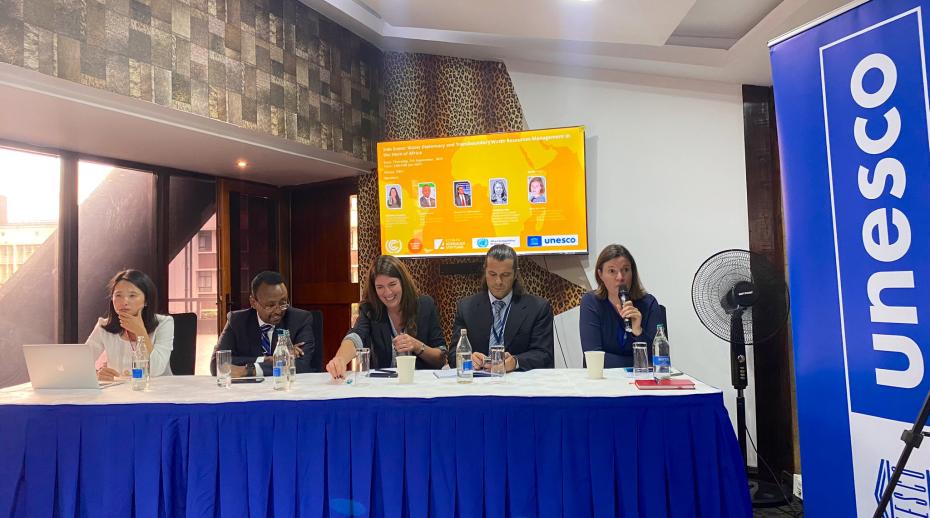
The Stockholm International Peace Research Institute (SIPRI) played an active role in Africa Climate Week (ACW). The event was held in Nairobi, Kenya on 4–8 September and is one of four regional climate weeks to help build momentum ahead of the United Nations Climate Change Conference (COP28) later in the year.
Dr Kyungmee Kim, SIPRI Researcher, spoke on a panel on the topic, ‘Water Diplomacy and Transboundary Water Resources Management in the Horn of Africa’. Prolonged drought in the Horn of Africa has impacted 36 million people, with 20 million facing severe food insecurity. Limited water access, livelihood loss and conflicts have ensued. Most of the Horn of Africa’s population live in regions with shared water resources that lack cooperative frameworks. This event aimed to unite stakeholders to discuss inclusive, resilient regional water management. The side event was co-organized by SIPRI; the Office of the Special Envoy for the Horn of Africa; the UN Educational, Scientific and Cultural Organization’s Regional Office for Eastern Africa; Konrad-Adenauer-Stiftung; and the African Ministers’ Council on Water.
Additionally, during ACW, Dr Karen Meijer, SIPRI Senior Researcher, spoke at an event on, ‘Enhancing Locally-led Climate Action: Integrating Peacebuilding and Conflict Management in Climate Action Plans for Kenya’s Hotspot Counties’. This event concentrated on Kenyan counties situated in regions susceptible to climate-related insecurity. It aimed to illuminate techniques that can amplify the implementation of successful resilience-building practices found in Kenya’s National Community Climate Action Plans. The side event was organized by SIPRI, Friedrich-Ebert-Stiftung, the Panafrican Climate Justice Alliance and DaleAgro.
Aside from disseminating research, SIPRI acted as a convenor for the ACW side event on the topic, ‘Climate, Peace, and Food Systems: Empowering Africa’s Resilient Solutions’. The side event showcased the success stories of African communities that have embraced sustainable practices, climate adaptation strategies and peacebuilding efforts. By recognizing and promoting these local initiatives, the event sought to inspire and mobilize stakeholders to scale up climate finance access for fragile and conflict-affected countries. The side event was co-organized by SIPRI, the Humanitarian–Development–Peace Nexus Coalition, the UN Famine Prevention and Response Coordinator, Welthungerhilfe, CGIAR and the Climate Resilient Food Systems Alliance.
About SIPRI’s work on Climate Change and Risk
SIPRI’s work on climate change and risk provides reliable insights on how climate-related security risks evolve and how they are interlinked and interact with different social, political and economic processes. SIPRI researchers also analyse how different policy organizations are responding to these risks and provide advice on conflict-sensitive adaptation, mitigation strategies and how international efforts for sustaining peace can be achieved.
Click here to read more about SIPRI’s work on Climate Change and Risk.